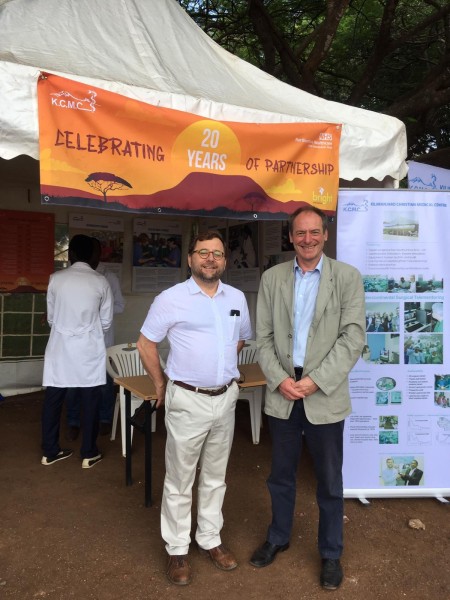Publish date: 14 December 2022
New research group seeks to overhaul Parkinson’s care in sub-Saharan Africa
A North East medic is leading a major study involving seven different African 
Professor Richard Walker, a consultant physician specialising in elderly care at Northumbria Healthcare NHS Foundation Trust, is the director of the Transforming Parkinson's Care in Africa (TraPCAf) group, which has received a £3 million grant from the NIHR’s (National Institute for Health and Care Research) Global Health Research programme.
Professor Walker (on the right in the photo) is also Honorary Professor of Ageing and International Health at Newcastle University, the contracting organisation for the TraPCAf research, which will gather vital information on Parkinson’ disease and the effectiveness of current treatment over four years working with colleagues in Tanzania, Kenya, Ghana, Nigeria, South Africa, Ethiopia and Egypt.
Worldwide, the largest proportionate growth in people over 60 is taking place in low and middle income countries, such as those in sub-Saharan Africa. This results in a large increase in age-related conditions like Parkinson’s and dementia in areas already trying to cope with a higher burden of infectious diseases.
There are also very few medical specialists, leading to an estimate that half of the people with Parkinson’s globally are not diagnosed.
Professor Walker said: “While there is no cure, there is effective drug treatment available for Parkinson’s, but access is very limited in sub-Saharan Africa. Undiagnosed and untreated people will have a much poorer quality of life and reduced life expectancy.
“There is also a lack of awareness among the public and health professionals, so people often don’t recognise symptoms or access medical help. Even if they do, they may be incorrectly diagnosed, which is why this research is so important.
“We will test ideas for helping diagnosis and management, and develop support including patient and carer information. Other aims include strengthening research capability in Parkinson’s in Africa, while also linking in with another study looking at the genetics of the disease worldwide, including Africa.
“One of the elements will build on a recent study in Ghana to look at the effectiveness and side effects of using Mucuna pruriens (MP), a tropical plant, compared to the standard drug treatment Levodopa in Tanzania. The signs so far are that MP is affordable and effective with limited side effects.”
Professor Walker has been involved in projects in sub-Saharan Africa throughout his career and is an integral part of the partnership that Northumbria Healthcare and its charity Bright have with the Kilimanjaro Christian Medical Centre in Tanzania.
Media contact
Ben O’Connell, media and communications officer, Northumbria Healthcare
Benjamin.O'Connell@northumbria-healthcare.nhs.ukor 07833 046680.
